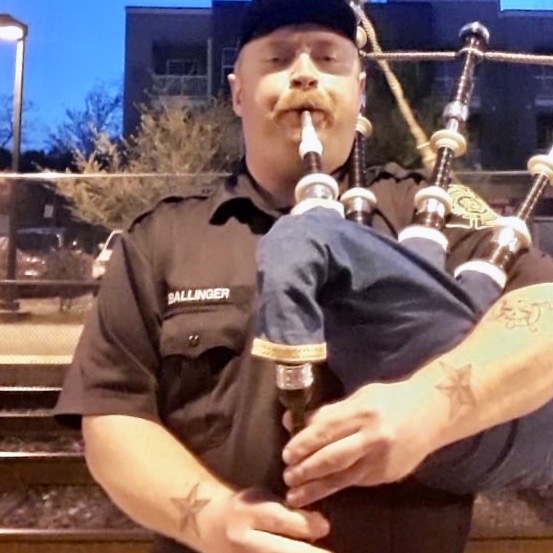He doesn’t remember the first beating he had at the hands of his mother. It happened before he was born. “My older brother Patrick told me that he saw her punching her stomach over and over when she was pregnant with me,” says Ken Doyle, 44, sitting in his Gloucester City, NJ, row home, his arms around his blue-eyed white husky, Lobo. “She was shouting, ‘I don’t want this f——-g child.’”
And it was clear she didn’t want him. Or Patrick either. In the book the brothers wrote—“Mother from Hell,” published last month by O’Brien Press in Dublin—chronicles the horrific abuse the two boys underwent growing up in Tullamore, County Offaly, in the 1960s and 70s. While their father, Patsy, was away in America working, they say, their mother Olive starved, beat, and humiliated them on a daily basis.
She stuffed tea towels or nylons into their mouths to muffle their screams, tied them to a chair, then beat them senseless with a wooden cheese board. To hide the bruises, she would plunge them into a cold bath and then lock them in their bedroom—which they called “the torture chamber”—until the bruises faded. They were forced to cook the meals every day, but not permitted to eat anything. To prevent them from sneaking food while she took her afternoon nap, she tied them to her bed. In the morning, she sent one or more of their other seven siblings with them to school to make sure they didn’t get food from anyone—or from the trash bins they would creep from their room at night to raid.
Though she had a perfectly good vacuum, she made them pick up dirt from the rugs with their hands, scrub the linoleum floor with a toothbrush, and the toilets with their fingernails. She would strip them naked and pin on a homemade diaper made of woolen cloth with a plastic trash bag over it, sometimes sewn to their shirts so they couldn’t take it off, parading them in front of the other children and encouraging them to laugh. Many days, they were forced to sit in their own urine. There was one thing that could sometimes protect them from their mother’s wrath –the things they stole for her. Jewelry, rose bushes from a neighbor’s yard, food from the supermarket, cut glass from shops, even money from the church poor box. Their mother would hand them cash, tell them what she wanted, and then send them out with the admonishment, “ and bring back the money.”
It was all a secret. She kept it from their father, they say, only abusing them when he was an ocean away. She kept it from the neighbors and the teachers at the National School by imprisoning the boys until they bore no marks of their torture, feeding them and giving them drinks only when they looked so ill they might need to be hospitalized. She kept them quiet with threats. Even when she stomped on nine-year-old Ken’s leg and broke it, fear of her retaliation kept him from telling doctors in the emergency room what really had happened. Instead, he gave them the story she told him to tell–that he had fallen down the stairs.
But it wasn’t a secret, something Ken and Patrick didn’t find out until a few years ago. When Ken, then living in Arizona, was undergoing treatment for serious spinal problems brought on by his early injuries, he wrote to Ireland for his medical records. Instead, he received his childhood history from 1965 to 1980, as recorded by the country’s social service system. It was in those records that they learned that their father had reported the boys’ torture at the hands of their mother to the authorities. “In 1969, my father went to the courthouse and reported that his six-year-old son—me—was wasting away,” says Ken. One document that appears in their book reads, “Father says child is neglected and is only getting one meal a day. Hospital admittance for malnutrition.”
“Until we saw that, we had no idea that our father knew,” says Ken, a former house painter who is now unable to work and runs a small, online Irish gift shop. Other documents—and there were more than 200 pages of them–revealed that many people knew, including Child Protective Services, local priests, doctors, teachers, neighbors, the boys’ paternal grandparents, their school mates, even the police whom Ken believes turned a blind eye to what was going on because their parents had friends on the force. Ken and Patrick were occasionally removed from their home by one authority or another and sent to boarding schools (in one, Ken was raped). But what respite there was, was cruelly abbreviated: They were always sent home on the weekend, and the abuse would continue.
“Nobody ever came to save us,” says Ken, whose dark eyes are both sad and wary at the same time. One of his teachers came forward, but only after Ken contacted the gardai a few years ago with the trail of evidence that had come to him by accident. “He told them he knew it was going on but by the time he realized it I had already been expelled from the school for stealing other children’s lunches and eating out of the bins,” say Ken. “After I was expelled, all the other boys came forward and told him what my mother was doing to me. But he thought it was too late to do anything.”
Ken eventually filed suit to force the Irish government to compensate him for his medical treatment, a case that dragged on for six years “because the government’s lawyer refused to speak to us.” It resulted in a small settlement that pays for his psychiatric treatment for post-traumatic stress disorder, but nothing else. Ken is on six medications that he pays for out of pocket, and he can’t afford the spinal operation that might allow him to live without constant physical pain. Patrick, a father of seven who lives in Wales, has a congenital heart problem and needs a transplant, but his treatment is covered under the UK’s health care system.
In 2002, the Sunday World, Ireland’s largest circulation newspaper, wrote about the Doyles’ case in a story headlined, “The Most Evil Mum in Ireland.” It drew the attention of O’Brien Press, and Ken and Patrick, working with writer Nicola Pierce, spent two years composing their brutal memoir, in part to help deal with their lingering demons: Both men have a history of alcoholism and substance abuse; both have contemplated suicide. A younger brother who was not abused did kill himself several years ago. “We were all living under the same roof,” says Ken, by way of explanation. “There was a lot of damage to the rest of the family.”
Ken has only returned once to Ireland since he left in 1980—to deal with his case against the government. And he hasn’t seen his mother since then either, though they spoke on the phone and he asked her pointblank why she abused him. He recalls that conversation dispassionately, though it is chilling.
“I asked her, ‘Why did you do what you did to me as a child?’” Ken says. “’Why did you starve me?’ She said, ‘You didn’t like food.’ At one point I was diagnosed with celiac disease which was the only way they could explain my symptoms, though they were caused by starvation. Then I asked her, ‘Why did you break my leg?’ She said, ‘It was self-defense.’ When I talked to my father, his response was, ‘I don’t want to talk about it. It’s all water under the bridge.’”
But for Ken Doyle and his brother, their ruined childhood, no matter how many years pass, is as present as the nightmares, the rage, the physical pain they deal with every day. “I walk around every day in pain knowing who is responsible for my pain,” he says.
Ironically, those reams of paper that unraveled their story served only to deepen Ken’s anger, and not just at his parents. “What I have had trouble coping with is that other people knew and could have saved me, but they did nothing to stop it,” he says. “In my mind they are as evil as my mother. I wouldn’t have minded so much the little bit of money the Irish government gave me if there had been a little apology. ‘We’re sorry, we screwed you over, we failed you.’ But there was nothing.”
His book, which his mother has told him she won’t read, is his attempt to make something good out of the life he believes she destroyed. “I hope people read it and if they see a child who is hungry or in pain that they’ll do something,” says Ken. “Children have the right to be nurtured, educated, safe at home—things that we didn’t have. They have the right to survive.”
“Mother from Hell” will be in Irish bookstores in June and is available in the US on Ken Doyle’s website at www.emeraldisleirishfoodsandgifts.com or by calling 1-856-456-8959. You can read more about Ken and Patrick’s ordeal at http://home.comcast.net/~cooffaly64/ .


